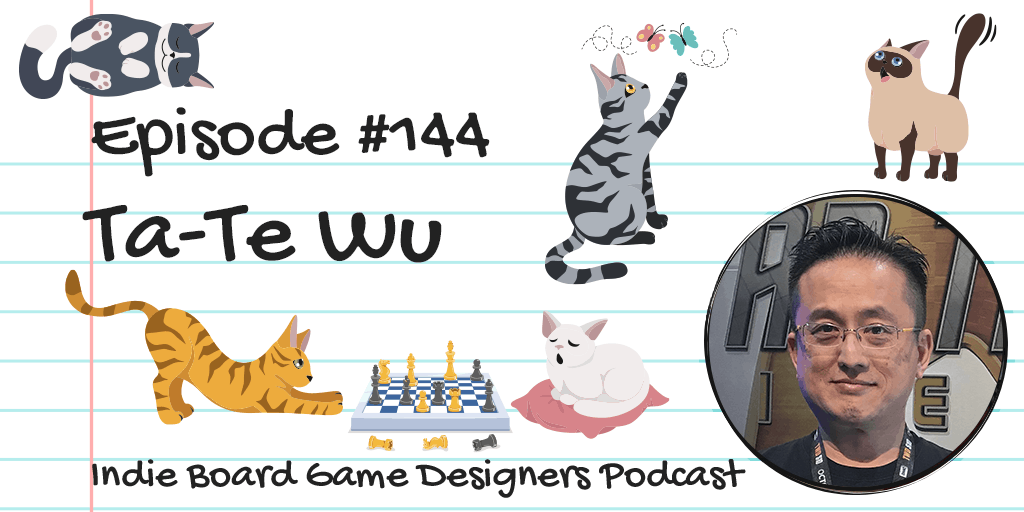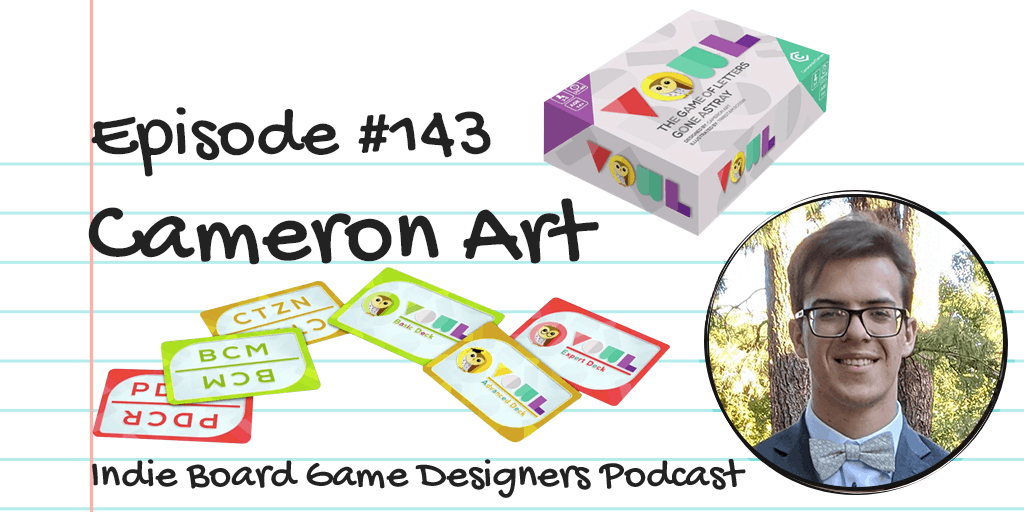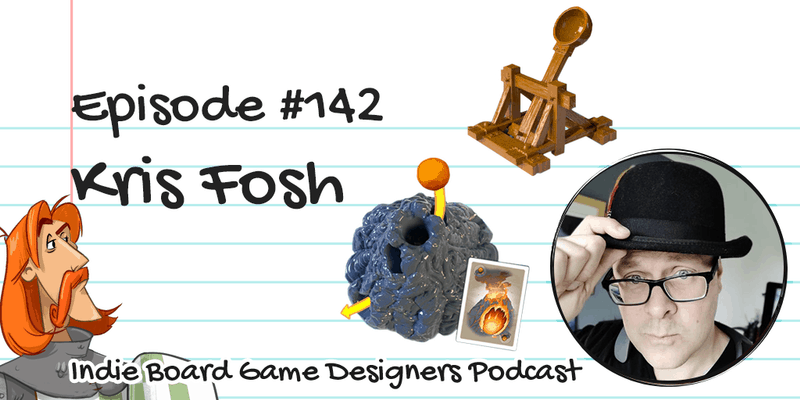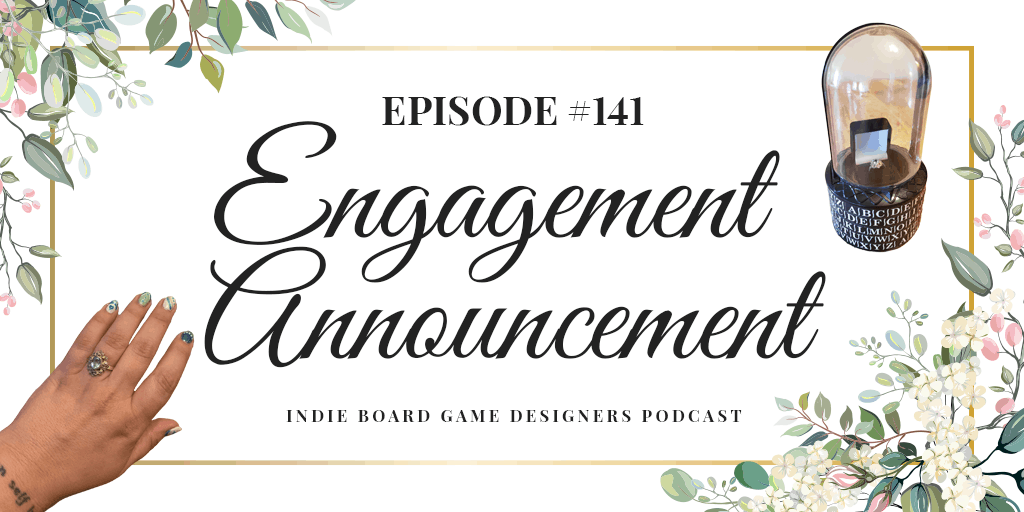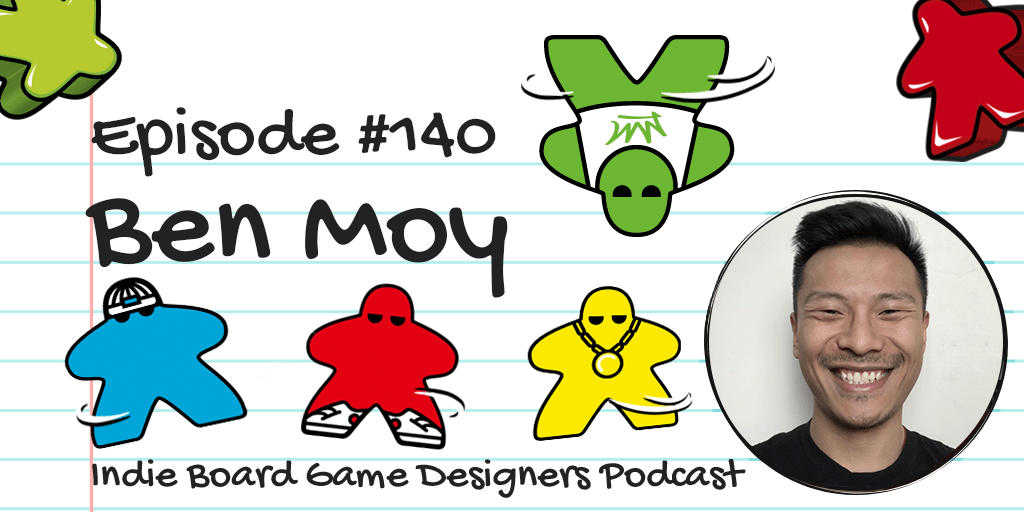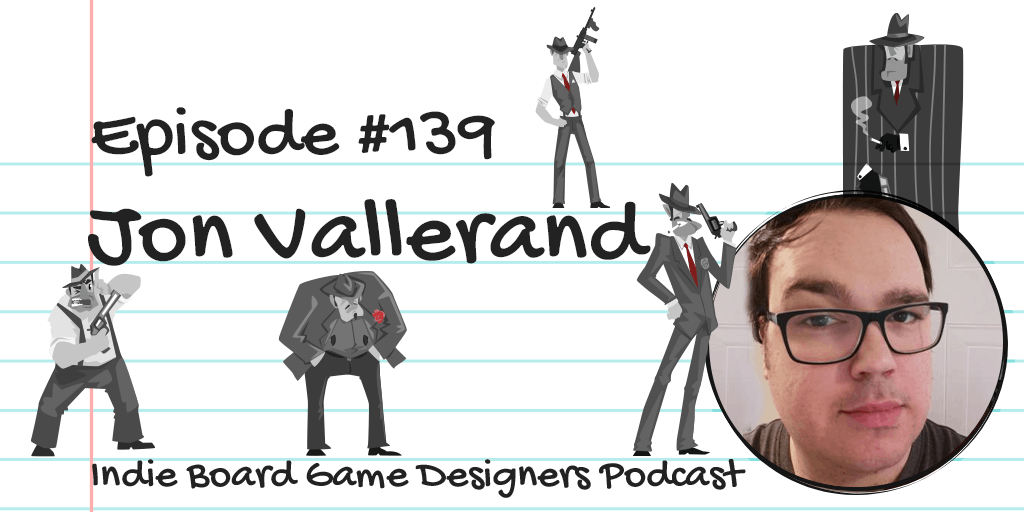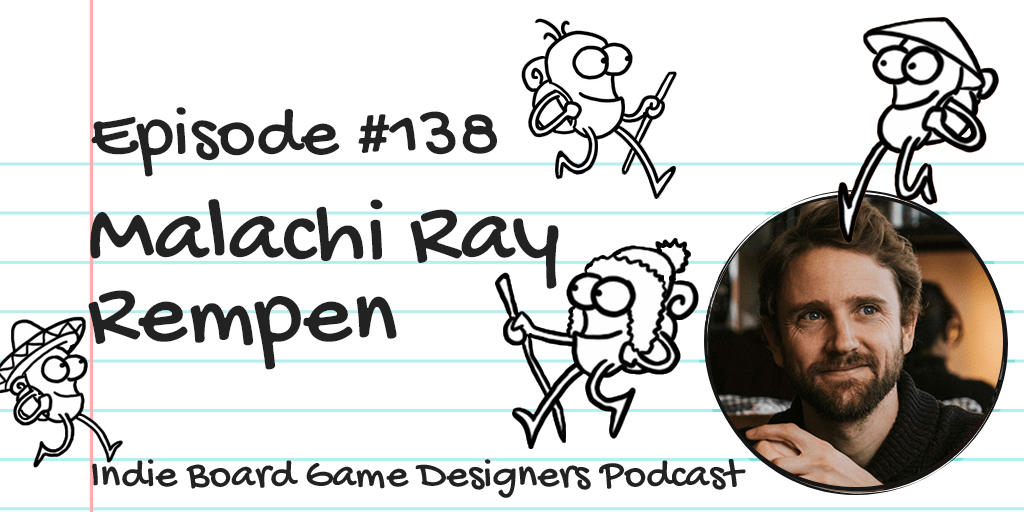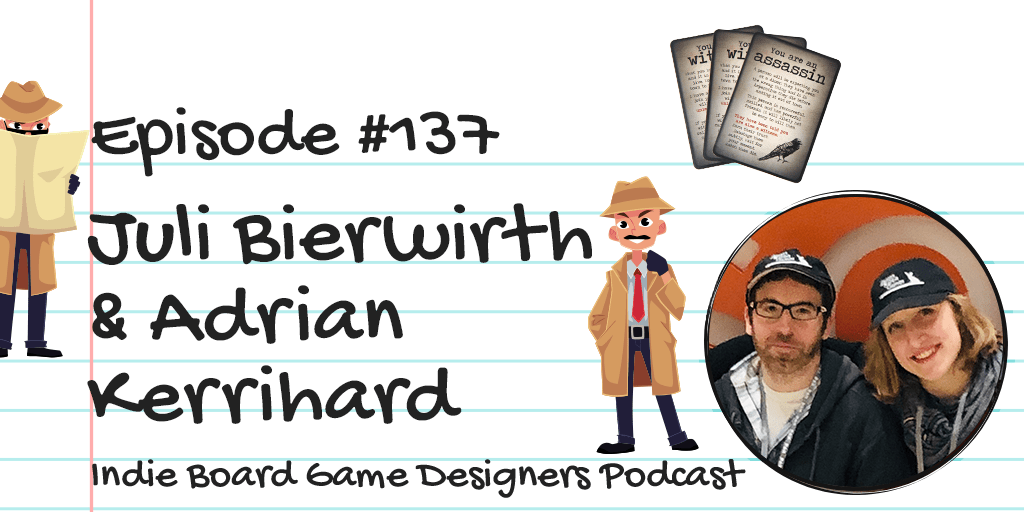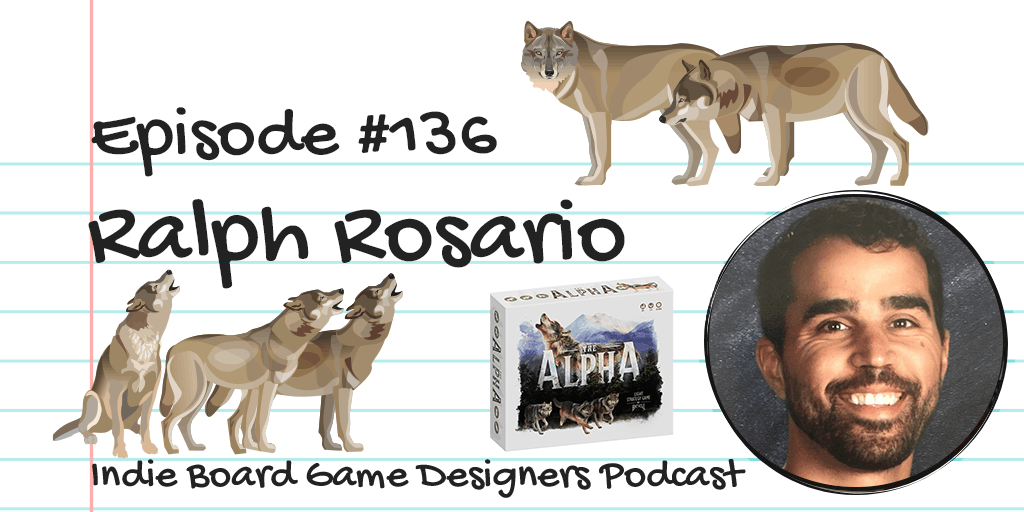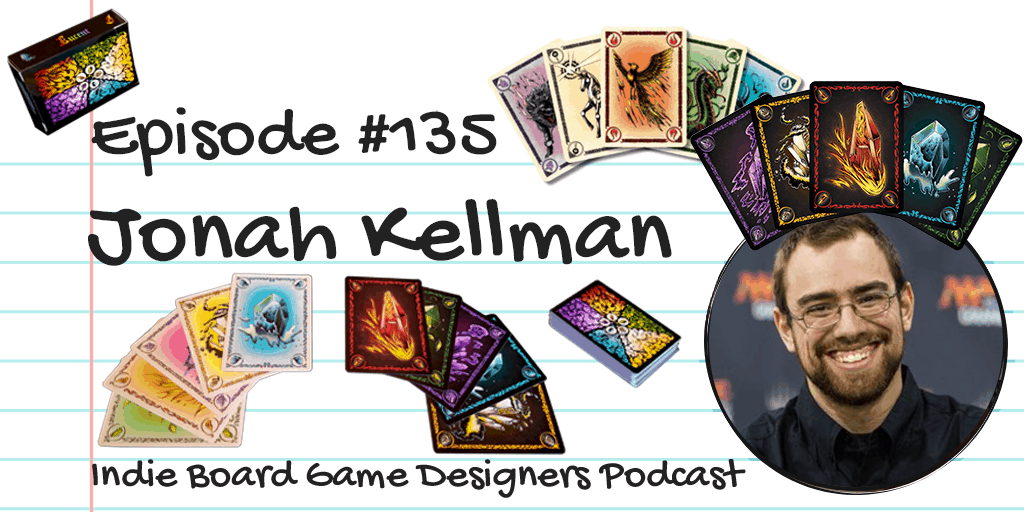Podcast: Play in new window | Download
Subscribe to podcast: Apple Podcasts |
Patrick Rauland: Hello, everyone. Welcome to the Indie Board Game Designer's podcast, where I sit down with a different independent game designer every single week, and we talk about their experience in game design and the lessons they've learned along the way.
My name is Patrick Rauland, and today I'm going to be talking with Ralph Rosario, who designed The Alpha. He has another game that has been signed but hasn't come out yet, and he is a member of my local game design group here in Colorado. Ralph, welcome to the show.
Introduction
Ralph Rosario: Thank you, Patrick. Thank you for having me. This is great.
Patrick: I know you because we've been going to the same game design group for a while, but the audience doesn't, so I've got a lightning round to introduce you to them. Ready to go?
Ralph: I'm ready.
Patrick: All right. If you're stuck in the wilderness, Ralph, what food do you think you could scavenge or round up in some way?
Ralph: Boy, I would be in huge trouble. I've watched lots of Alone, which is show on History Channel where it's got these survival experts who just go and have to live as long as they can off of nothing, and they just bring some supplies and build their own shelter and everything. I think I could maybe gather some nuts or something, but I think I'd be dead pretty fast or be calling for help quickly.
Patrick: Ralph, I think I could find or discover mushrooms, but I would just eat them and hope they're not poisonous. So, I would definitely die probably before you would. What is your go-to quarantine game?
Ralph: I haven't played many physical games, I've played more online. I've played lots of Potion Explosion, a little bit of Carcassonne and then some Ganz Schon Clever. So, quick little things that I can do online. I got the Humble Bundle.
Patrick: So these are on Steam, then?
Ralph: Yeah. Potion Explosion and Carcassonne are on Steam, and then Ganz Schon Clever is the online website where it's technically in German, but you just need to click numbers and push stuff. I've been doing that for a while.
Patrick: Cool. Very cool. Then if you're at a con with someone and it's the end of the day, and you're tired, but someone says, “Ralph. One more game.” What is that “One more game” that you'd be willing to play?
Ralph: I think I'd just say No Thanks because it doesn't require a lot of thought. It's just super simple and quick.
Patrick: OK. Very cool. I don't think I've– Did you make me play No Thanks? I think you did.
Ralph: I think I did, yeah. It's where you've got the cards numbered 3 to 32, and then a couple are removed, and then you have to decide, “Do I want this, or do I pass?”
How did you get into board games and board game design?
Patrick: Yes. Got it. Very cool. OK. I don't know the answer to this, Ralph. How did you get into board games and board game design?
Ralph: I always have been into games and competition, so my family is very introverted, and you know me personally, so you might see that I'm somewhat introverted as well. However, compared to the rest of my family, I am a giant extrovert. I always needed something to do because conversations were not happening, and I found games as an escape, and I also found sports as an escape.
As an athlete in high school and an athlete in college, when I met my now wife, we did lots of sports. We played lots of volleyball and flag football and softball and everything, and then she ended up when we moved to Colorado, she tore ACL so we couldn't play sports for a while. Then I started playing more games and buying more games because I needed something to scratch that competitive itch.
Then we started to snowboard again, and then she broke her wrist again, so then I got more and more into games. Again, it gives me that outlet for having some competition. That's the biggest thing. But back when I was in college, my mom got me Carcassonne and Catan, and at that point, I thought, “These games are cool. But they're also really complicated, and I don't want any part of them.” Then as I've gotten older, I guess I've matured, and now I see those games as simple and want a little bit more.
Patrick: Very cool. I knew your wife had some– Like, tore her ACL at some point. I didn't realize that's what got you into games. It was basically that you were forced to stop sports so it opened open up time and you found that games could fill that hole.
That's pretty cool. OK, I want to talk about your game The Alpha, because it's actually– My side of the story is it's one of the first games that I played at the– Boy, let me see if I remember the name.
Ralph: Prototopia?
How did you move your game along so quickly?
Patrick: Yeah. Our local meetup group is called Prototopia, and it's one of the first games I played there. It's cool to see you start what you– You came in, I think I wrote down here in my notes, I think I played your prototype in early 2018, and you had it signed by Bicycle.
Or, I think it's now Games by Bicycle as their hobby game division in August of 2018. It was cool for me to see you rapidly develop this game and you came up with lots of versions and tested this and tested that, and you pitched it, and I almost want to say it was like you pitched it, and they were just like “Great,” and it just worked. How did you make the game so quickly, Ralph?
Ralph: It felt like tons of luck. I think I just combined lots of ideas that I had from other games that I played. I like Formula D, and what I liked about Formula D, the racing game, was the dice grow as you increase in speed in the game. I thought that was cool, it was very easy to understand, and it had simple decisions.
But there was some luck in it and also some strategy, and so when I was designing my game, I wanted the same idea. Originally I had started with different sized dice to represent the different animals in the game, and then I ended up making it simpler because D6's are easier to produce. So I changed that, and I wanted to create simple decisions, and I think I started with a good base.
When I originally was testing it, I brought it to board game republic, which is a food cafe with board games, and I had never been to one before. I tested it, and I got feedback from this other local designer who seemed to know what he was talking about, and I was like, “Maybe there is something to this. I should keep trying.” So I looked up more groups and then found the Prototopia group, which is where you play tested it.
Then we all– I kept getting good feedback on it and minor suggestions and feedback, so then I'd make those changes, and it just seemed to come along quickly. I don't necessarily believe that was all of my doing, and it just felt fortuitous to me. I also got good feedback from people, so that helped. I guess I should also explain what the game is.
The game is a “Push your luck” area control game. In the game, you control a pack of wolves, and you're hunting food, and so you're hunting for different animals in the forest. There's some animals in the near forest, some animals in the far forest, the small animals, are in the near forest, and the big animals are in the far forest.
Each animal has a different payout in terms of the amount of food you can get, so you have to decide, “Do you want to play it safe and go for the small animals, or do you want to be more risky and go for the bigger animals?” I think the other thing that I wanted to do with this game was I was listening to Ludology at some point, and they had an episode on the prisoner's dilemma.
When I was in college, I majored in psychology, and now I'm a mental health counselor, so I've always found a prisoner's dilemma super intriguing. Not a ton of people who aren't into games or game theory are familiar with it, but it always creates an interesting social dynamic to me. I wanted to incorporate that into the game, so that's the tiebreaker mechanism in my game.
You use this prisoner's dilemma, and it's not just a one-time thing, it's a multiple-time thing. It also can be a three-person prisoner's dilemma or a four-person prisoner's dilemma. It creates this fun tension and fun social dynamic that breaks away from the game but is a meta that's formed within the group. I think that just hooks people in as well.
Patrick: Yeah. The prisoner's dilemma is a huge part of the game, which is fun. I just want to go back to one thing, Ralph, because I don't think we talk about this enough. It's cool to hear, and I think also I have the context for how this game started and what it is now. But in your early versions, I think a berry was a D4, and a small animal was the D6, and a bigger animal is a D8, and an even bigger animal is a D12, and then the bison was a D20.
Different sides met different things, and as you said, you did later go to D6s. It's interesting to me that your inspiration, Formula D, I've played that where lowest gear is the D4, and the next gear is the D6, the next gear is the D8. You get it. It's cool to hear that you were inspired by this game, you took something from it with a different dice, and then at a certain point you left the different dice, and you kept more or very similar probabilities on the D6s.
That's cool that you're able to let that go because I think lots people would have held onto that, and it would have made the game a little bit more putzy, I think.
Ralph: Yeah. It changes the payouts, and then you've got to manufacture a bunch of different dice as well, which seems like a giant headache for people who do that. I thought it would be easier for someone to be like, “This works. We could figure this out.” As opposed to figuring out all these custom dice that are various sizes as well.
Patrick: Did you figure that out before pitching to the publisher, or is that something you discussed with the publisher after they signed it?
Ralph: I think it came from– I was reading through a bunch of information from different websites, specifically on board game design, which many guests have talked about. They were just talking about the challenges of manufacturing, and I thought, “I can do the same thing with D6s.
I just need to work the math and work the numbers for the different distributions of resources on the dice. I can do that and keep the same feel, so I did it before I had shown it to publishers. Again, it's still kept everything similar, so it works. I got lucky again with that because it was like, “This seems like a good idea. Let me try it.” And then it just worked.
Patrick: Great. Can you tell me what is the process? Or, what was your process of getting it signed?
Ralph: Again, I was bringing it to these groups to try to get some feedback, and then it was, again, more research trying to figure out “How can I get this in front of people who need to see it?” I had blindly sent emails to companies that had produced one positive result of someone asking for more information, but nothing seemed to work. I had made a sell sheet, and I had made a rules document at that point, but I did not have a video, and it was just a text description.
But then I changed course and decided, “These people who are in this game design group in Denver are going to go to Origins.” I didn't even know what a board game conference was, and I was like, “Sure, let me go. I can go with these people. They seem to know what they're doing.” I went with them and just trusted the process, and I had done some research and made sure I've got a sell sheet, and I've got rules that are printed, and I've got prototypes ready.
So I did all that, and then I was actively trying to figure out about publisher speed dating, which was huge for me because that got me in front of a ton of people, and I didn't need to schedule things. Then it wasn't me trying to get in with my reputation, and it was they were looking for something. I randomly and luckily found a sign up for that on the day it happened, so I got into the batch, and it was a first come first serve thing.
I feel super fortunate in that and kind of greedy as well, but you and then our other friend Jonathan Woodard in Colorado, he got in as well. We all got to go to this event and pitch our games at this speed pitching event, so that was super helpful, and that's what ended up making this game get signed. Interestingly enough, I was pitching it, and I don't do any selling. I just describe the game as it is, and if they're into it, they're into it. If they're not, they're not.
But I just let it be, and I don't think I was desperate in any way. In terms of like, “Here's what this does. It's so awesome. It's so incredible.” It was just, “This game does this. Blah, blah, blah.” Then I just let it sit with silence in terms of feedback. And if they showed interest, great. If they didn't, they didn't. I honestly left, and I felt there were maybe two companies that were interested in the game when I left the event, and I was super excited about that, but then I didn't hear at ton from them.
Then a week later, after Origins, I got an email from Bicycle. They're like, “We want to playtest your game, can you send us a prototype?” And I said, “Sure. Let's do it.” I sent the prototype, and then two months later, they sent me another email, “We want to talk to you about signing a game and a licensing agreement. Can we make that happen?” I said, “Yeah. Great. Here, schedule a time.” Then we called, and we talked on the phone, they explained their process for about half an hour or so.
Then I read over the contract, and I talked with Jonathan, who had two games signed at that point, and I asked for his feedback and input on what I was reading. Then I signed the deal and turned it over to them, and so it was– It seemed crazy because that was, again, the first conference I had gone to and it somehow worked out. Again, I wasn't selling anything, which was the interesting part to me. They just seemed to want it. Again, it was another fortuitous thing. I'm going to keep using that word, but it just seemed that way.
Patrick: I want to jump in here, because first of all I had Jonathan Woodard on in Episode 60, I'll link to that in the show notes. All of us went to that same speed dating event, and it's fascinating. Ralph, I love your story because I've heard from some people who they plan 20 publisher pitches over a Gen Con weekend. I just can't do that.
That's not my style, I want to play games, and I will go to speed dating events like you did, but I am definitely not going to set up a million publisher meetings because it's putzy and it's not what I go to game cons for. But Ralph, I love hearing that you went to your first game convention, you didn't know what it was, but you just went and then you signed up for speed dating the day of.
You go there, and you just tell people your game, you're not hyping it up. You just tell people, “Here's my game.” Two people are interested, and then it just worked. It's great to hear that, Ralph. I think it's nice to hear that not every single time, you need to put in a ton of legwork. Sometimes it's about putting– Obviously you did, I shouldn't say “Putting in enough legwork,” because you did so much work preparing the game, tweaking the game and preparing the game manufacturing-wise.
Switching to the D6s and having a sell sheet, you did all that, and then it was great. You had a publisher speed dating event, and you found the right publisher, they found you, and it didn't require hours and hours and hours of researching publishers. It just took a little bit of legwork, but not a crazy amount. I love hearing that.
Ralph, I don't think I realized this, but I have to find the episode number. We went to the same speed dating event, and I think technically you went on day one. I went on day two, but it was the same type of event. What's interesting is you had two publishers interested in your game, and I had two publishers interested in mine, and it's helpful to know that one of them took my game home and didn't sign it, and one of them took your game home and did sign it.
There's something about you just have to keep trying until you find that right fit. At some point, that'll happen, and Ralph, it's so cool to hear that happened for you on the first try. It gives me hope.
Ralph: A lot of it, it makes me think of dating in general where it's somehow about fit, and if there isn't a fit, it doesn't work out. Some of that seems like fortune, and some of that seems to be a result of planning. In my case, it was more fortune, but to any game designer, I think that's a good sign.
If you can find the right fit or they seem to find you, it will work out. Or sometimes it just might not be the right fit. That's not anything personal, and it just wasn't the right place at the right time.
Bicycle is releasing your game directly to retail. Is there any loss in not having a Kickstarter?
Patrick: Yeah. So, Bicycle– Or I should say, Games by Bicycle, is releasing your game directly to retail. Just in this day and age where I'm just so used to backing games on Kickstarter, it's funny that it's a little weird for me. I know certain companies like Stonemaier Games, they release directly to retail, and you can preorder through the website, but it's not Kickstarter.
But I love that they're doing this, and I should say they are releasing your game on June 16th. I had to look that up, but June 16th and we are recording this a couple of weeks ahead of time. But this episode should come out on June 16th, or a couple of days after.
So as soon as this episode comes out, your game should be available in stores, which is cool. But are you a little bummed? Or, do you have any thoughts about not being on Kickstarter? Does that bug you at all, or are you totally fine with that?
Ralph: I am completely fine with it. Going into this whole thing, I had zero interest in trying to publish games myself. I don't feel like I have enough interest in trying to make money. It's more like the creation aspect that I enjoy. I felt like I made this cool thing, and I wanted people to do it. If people bought into it, great, then they will go and manufacture it.
I don't feel personally losing anything regarding Kickstarter, and it sounds to me Kickstarter produces tons of anxiety and worry and excitement and everything and an emotional roller coaster. I don't think I necessarily want that, however, what's interesting is Kickstarter can give you immediate feedback on “What's the market size for this game?” I feel like that's something I am missing out on, and maybe my game will sell nothing, and maybe it will sell a ton.
I don't know. I just have to wait, and it's like a playtest session. I go to test my prototype, and I don't know what's going to happen, and people might love it, and people might hate it. I just have to sit with that discomfort, so I think I think that's the biggest loss. I'm not getting immediate gratification or immediate feedback on what the market is like.
Patrick: Yeah, I guess you do lose some immediacy. It is nice knowing I had 5,000 people back the game, and you know you're going to make slightly more than 5,000 copies. But also Ralph, you pointed this out, and I don't think we talk about it enough, I would say Kickstarter gives you high highs and low lows. When you exceed your expectations, everything's amazing, and I didn't have too many user questions because I only had 500 something backers or just shy.
But you also do have the low lows, where you're not meeting your funding goal, or you're running ads, and you're using– You actually have to spend money, and then you're not making the money back. There is something great about not dealing with that. Yes, you get excitement, but you also get to skip the anxiety that comes with that. That is a great point of feedback.
Ralph: Yeah. The emotional impact and the financial impact of running a Kickstarter is way different, and you can be a little bit more detached if it goes straight to retail.
How important is a local game design community?
Patrick: Very cool. So you cued this up just a couple of sentences ago, but what is–? How important is this local game design community to you? I know we've been in the same one, what does it give you? I don't know if this is the right way to frame it, but what would have happened if you didn't have this local game design community?
Ralph: I think the biggest thing would be bias in some feedback that I'm getting, if I playtest with my wife or my friends or close friends, I think they're honest with me. However, I also think they're going to tend to be mindful or aware of how I might feel about their feedback, and they might cushion what they say to me, whereas in this game design group the explicit purpose is to test games and give feedback and do it in a more procedural way, in a sense that you're trying to make good games or better games and you don't care about the designer's– This doesn't sound right, but the designer's emotional well-being.
Where your friends or family might be more caring about how you feel as opposed to the product that you created, and so it's been awesome because I've also gotten tons of diverse feedback. There are people in that group who do not want to play The Alpha ever and seem to dislike it, and it's not in their comfort zone, and there are other people who love it. And there are other people who might not necessarily like it, but they have fun while playing with it because of the people they are with.
I think that's the neat part for all of us if you're in that group you're creating community within the group. You're also getting lots of eyes on the game that are not necessarily intimate relationships with you or close personal relationships with you. It gives lots of different feedback. Also, when I playtest your games or playtest anybody else's in the group's games, I can pick ideas from what they're doing or what they've designed, and I can hear lots of feedback. Lots of the feedback that you hear when you're playtesting a game is just general feedback on the game that isn't necessarily– Like, you'll get lots of solutions to a problem.
Again you need to filter through that and figure out, “What is the core experience or the core game that I want to create? Does this match?” I got tons of feedback. One of the things is my game has luck in it. There's no doubt about that. I got a suggestion at one point to add a spinner to resolve conflicts. I was like, “OK. That is an idea. Thank you for sharing that. I appreciate that. That would, I guess, give people more random outcomes as opposed to it being predictable.”
So again, I need to validate that person's experience, but also I need to filter that through and say, “That doesn't match with the experience that I want to try to create in this game.”
Patrick: I just love getting feedback like this. It's like, “Here's my game. The point of the game is to lie and deceive your friends.” “I like this game because you have less lying and deceiving your friends.”
Ralph: Exactly.
How do you approach feedback when play testing your designs?
Patrick: Like, “I hear you.” Because one of the core parts of your game is this prisoner's dilemma to resolve ties, and you can hear the feedback about why someone might not want that, but you still don't want– You can hear the feedback, but if that's your goal, then you're just not going to act on it.
So you wrote this question here, Ralph, and I think you just answered it, but let me know if there's anything you want to add onto it. How do you approach feedback when playtesting your designs?
Ralph: I wanted to add one other thing. The other thing I would add is I'm going into playtests, and I get feedback from Patrick on my game that turns are taking too long. Based on all the testing that I've done in the past, turns are the appropriate length. They used to be way worse, and Patrick is the single person that keeps saying this. I need to aggregate all that data and determine, “Is Patrick's voice being heard and listened to?” What might happen is over the course of three weeks, I decide to completely disregard Patrick's feedback because it's the only person that's saying that.
However, in three weeks, I might come to an Epiphany. I'll be like, “What Patrick said makes a ton of sense. I need to do that. I need to shorten turns.” So I take in, or I try to take in all feedback, whether it is valid to me in that moment or not, and then reflect on it later on. There's no specific procedure that I use. But I think there's truth in what everybody says, and I need to respect that and then at some point potentially revisit it.
That happened multiple times over the course of this design as well, and it was that someone would say something and I would disregard it. Then two weeks later, I would recall what that person said, and it was like, “That was a really good idea. In the moment I was internally defensive, I didn't express that outwardly. But then I realized there's lots of merit to that, and I need to try that, and then I'd try it, and it worked.”
And I'm like, “Oh my God, that was brilliant. Thank you for that.” I can point out to four or five people who gave me feedback on The Alpha, and I can say that specific change in the game came from your suggestion on this one day. I talked to them about it, and they're like, “Really? I didn't even know that.” And I was like, “Yeah. You said that, and that totally made a huge impact on the game.”
I think it's taking feedback from everybody, even if you disagree with it in the moment, and then look back on it later. Again, it could be something that's valuable.
Patrick: I love that. I think I had a similar experience with some of my games where if someone says something that's against my intuition– I think the turn length is a good example, let's say I think I have short turns. Only one person says, “These turns seem long.” I always write it down, and then I go, “OK.”
You thank them for their feedback, and they gave you their time even if you disagree with it. But I think for me, what's helpful is to sometimes look back through my feedback and then maybe I look back through the last ten playtests, and I'm like, “One person in each group said that the turns are a little bit too long,” and I sometimes don't always notice the trends until I look back on my notes or until a couple of weeks have passed.
So I love– I think there's something very valuable about taking in every single piece of feedback, and sometimes you don't act on them, but just being open to– I guess this is about being open to acting on that feedback later, which sounds like you did a really good job of that.
Ralph: You and I have very different approaches too, it sounds like. Because you write things down, and I never write down the feedback that people tell me unless it's like “That was a super clever, brilliant idea. I don't want to forget this. I'm going to write that down.” I think I just somehow recall what was said, or the key things that stuck out. So that's interesting as well.
Do you have a white whale of game design?
Patrick: Is there an element of game design that you're working on that you haven't been able to crack? Is there a white whale of game design?
Ralph: Yes. So, I wanted to– I tend to choose topics that are different than the norm. I don't want to necessarily create trading in the Mediterranean games, or I don't know what else. A game about orcs and dwarves and elves and all that stuff, like a fantasy theme. I want to do something out of the norm, or I find something that was fascinating to me intellectually.
So again, I like the prisoner's dilemma, the tragedy of the commons. The one I've been trying to crack is figuring out the placebo effect, so I want to create a game that somehow uses the placebo effect in a game mechanic, but I cannot figure out how to do it. Every time I do, it seems like it's just a random luck of the draw thing.
I don't think that does it justice, so figuring out how to turn the placebo effect into a game mechanic would be incredible. If anybody has any ideas, I would love to hear them. Please reach out and share with me your wonderful ideas and I'll try to turn it into a game.
Patrick: So now is– I normally ask this at the end, Ralph, but where can people–? If they have an idea on a placebo effect, where can they find you?
Ralph: Only on Twitter is the best way for me for game design stuff, and I don't even post very much, but my handle is @CurlyandPickled. It's a weird name, but I have curly hair, and I like to play pickleball. So, @CurlyandPickled on Twitter.
What’s your favorite under-appreciated game?
Patrick: Awesome. Then I'm looking down through the other questions here, and you highlighted, “What's your favorite underappreciated game?”
Ralph: I got to go with Xenon Profiteer, it's by Eagle Griffin Games, and T. C. Petty III designed it, and I think it's super clever. It was deck construction and then deconstruction, so it reminds me of a new game that just came out through Game Right by Emma Larkins, which is deck deconstruction as well.
It sounds like her version is a little more streamlined, but I find it fascinating because it was, again, taking one mechanic and then doing the inverse of it. It's intriguing, and it's a unique topic, and also, the rulebook has some humor in it, which I think comes from the designer, which I also appreciated.
What one resource would you recommend to another indie game designer or an aspiring game designer?
Patrick: Ralph, you made me play this game, and I'm very happy you did. It is super fun. I would have never thought of a game like this, and it just feels very different. We're all used to deck-building games, and this is very different where you add cards to your deck, and then you filter them out, and then you get certain points for doing it.
Super fun. How about this, Ralph? You've been doing this for a while now, so you have one game signed, and it's going to be coming out when this episode comes out. You have another game signed in addition to that's going to be coming out a little bit later. What's a resource you would recommend to another aspiring game designer?
Ralph: I am going to do three. I'm a cheater. The first one I would do is I getting 8.5×11 sticky labels, so you go to Office Depot or wherever, and you can just use your printer and print on that and then just cut it into stickers and attach it to whatever you want. If you want to put it on cards or you, want to put it on tiles, and it's super convenient because, again, it's a sticker and it's a giant sheet of paper.
It's just like printing on paper. The second thing I would recommend is I tend to not like graphic design programs that are free because then I have to learn them. I also don't like graphic design programs that require a subscription because I'm cheap, and I don't want to keep paying for something, so I've got one for Mac and one for Windows. The one for Mac is called Graphic, and that's $30 bucks, and it's got plenty of features. If you know nothing about graphic design, it's got more than you need. If you know some about graphic design, it seems like it's got enough to satiate you.
It's not going to do as much as Photoshop, but it does plenty. Again, it's $30 bucks, and it's called Graphic for Mac. Then the one for Windows is Affinity Designer. That's the same thing, and it seems like it's got more features than the Graphic program. However, I think it's $50 bucks. I found a discount earlier this year, where it was $25 bucks during Covid.
So again, $25 bucks on this graphic design program that does a ton, and I don't need to worry about the internet cutting out. I don't need to keep paying a subscription. It works fantastic, and that's helped me just find graphics and put them into designs so that I don't have to create art myself. I can just pull things from the internet, or whatever.
Patrick: I will just second one of these. Ralph, I also got Affinity designer at the start of the pandemic, and I'm looking at their website. It is still currently 50% off, so for those of you who are listening, you can– It's 50% off. Just the last thing is it can open Photoshop files, so I've used other graphic design programs, and sometimes you find other assets, and they're created in Photoshop, and it's annoying when you can't even open those files.
It's nice to have at least one graphic design program that can at least open Photoshop files, and maybe you can pull a layered file apart or do something simple, then do other stuff with it. But it's just nice to have at least one program that can open stuff up. Was that it, Ralph? Two graphic design programs and the stickers?
Ralph: Two graphic design programs, and the stickers.
What was the best money you ever spent as a game designer?
Patrick: Perfect. So my other question then, Ralph, and I'm very curious on this for you, is what is the best money you've spent as a game designer?
Ralph: I am going to go with– What am I going to go with? We're going to go– I'm going to say– Man, I don't know if I have an answer. I should have known this because you ask this every single time, and I still can't come up with one.
I'm going to say going to Origins. Deciding to just jump off the diving board and just go, because 1) it forced me in front of people, and it forced me to show my game whether I was ready or not. I got valuable feedback from other designers, I got to connect with other designers, and I ended up getting a game signed.
Patrick: So, let me rephrase this. If you're an aspiring game designer– Because here's the thing, obviously, in your case your first con you got a game signed. Which is like, best case scenario. But even if you didn't get a game signed, would that still have been really good money spent?
Ralph: I think so. Because it opened me up to a whole new world because I had never seen– I'm going to be kind of mean here. I hope I'm not too mean. I had never seen that giant of a collection of geeks and nerds in my life, and it was great. It was great.
Everybody was super friendly, and everybody was super nice. Everybody was really, really into games. I think way more so than myself. However, again, it was awesome. It gave me a new perspective on game design as well because there's a vast amount of people that are interested in games.
What does success in the board game world look like to you?
Patrick: Awesome. Ralph, you've got a game coming out, and you've got a game signed. What does success look like to you?
Ralph: I feel like it's all about creating for me. That the perks of having a game signed and feeling proud of that fact and “Someone decided to take this thing that I created” is cool. But I don't anticipate making tons of money from it, or from game design in general, but it is a good creative outlet. I think that is success.
If I can continue to do it and find interest in it, and it gives me a sense of challenge as well. Because it's problem-solving, you try to make something, and it doesn't work, so you try to fix it. I think that's success to me if I can continue to try to solve problems and help others along the way.
Overrated/Underrated
Patrick: Awesome. So then I like to end with a game called Overrated/Underrated. Now I know you've listened to the show a couple of times, but just in case there's someone new who isn't listening, I'm going to give you a word or phrase and then you have to tell me if it's overrated or underrated.
So if I said, “Built-in webcams,” you might say, “Those are underrated because without paying any extra money, you can very easily have video conversations with people.” Something like that. Got it? All right.
Ralph: I always wanted– I want to call it “Choose a Side” because you have to pick one.
Patrick: Yeah, that's what makes it fun, Ralph. Because if I let you go, “It's appropriately rated” every time it's no fun. I want to paint you into a corner, either one side or the other. It's way more fun that way.
Ralph: Exactly, yes.
Patrick: I'm just going to go with an eight-sided die, a D8. Overrated or underrated?
Ralph: I'm going to say underrated because you don't see them very often in mass-market games, so not many people are familiar with them. They need to get more exposure. More D8s, please.
Patrick: All right, so we are recording a little bit after Memorial Day. Not “How was yours?” But just Memorial Day in general. Overrated, underrated?
Ralph: I'm going to go underrated because we need more days like that, where we're honoring people who have done service or committed to trying to make our world a better place. In addition, we need more days where eating brats and eating hamburgers is encouraged.
Patrick: Yes, more meat consumption days. I get that.
Ralph: Yes. Or more Boca burgers or Impossible burgers or vegetables. All that kind of stuff too, I don't want to be biased.
Patrick: How about painting miniatures? I'm going to add context for people here. I know you painted some miniatures for that Detective City of Angels game, so I know you've done this. Painting miniatures, Ralph. Overrated, underrated?
Ralph: I'm going to say underrated. For those who are not involved in it, you can create amazing things. I think you are phenomenal at painting minis, whereas I am like a third-grader painting minis. It's really neat, and I don't think enough people do it. I don't know if I would necessarily buy all this stuff for myself, however, I found it very fun to create.
Patrick: Cool. Just curious, have you played games with those miniatures, or has the game mostly been on the shelves, and you haven't got to experience the painted miniatures in the game?
Ralph: I haven't gotten it to the table again yet. I need to.
Patrick: Interesting. I think the last one, here's a very specific one. I want to go with coffee shops, but the context is during a quarantine. Overrated, underrated?
Ralph: Boy, I'm going to go underrated now as well. I have not been to one, and I need to get to one. However, coming up soon, I'm going to be taking a road trip somewhere, and I am going to be stopping at Starbucks to get some coffee, so that will be great. I think normally they're overrated and everybody goes to them and they're too overused, but now I feel like they're not getting enough attendance, or at least I'm not seeing it, and they're underrated now.
Wrap Up
Patrick: Awesome. Ralph, thank you so much for being on the show.
Ralph: Yes, thank you for having me.
Patrick: Where can people find you and The Alpha online?
Ralph: You can Google search Bicycle Games, and specifically under their games tab, you'll find The Alpha. Online, you could find me on Twitter @CurlyandPickled.
Patrick: Awesome. Listeners, if you like this podcast, please leave us a review on iTunes or wherever you listen to this. If you leave a review, Ralph said he would join you in howling at the moon. Which pretty cool for a wolf-themed board game designer.
Then I just wanted to share, if you like this show and you want to support it, you want to hear more episodes, you want to help keep the lights on, go ahead and chip in $5 bucks on Patreon. It would be appreciated. That is all I've got, everyone. Until next time, happy designing. Bye-bye.

